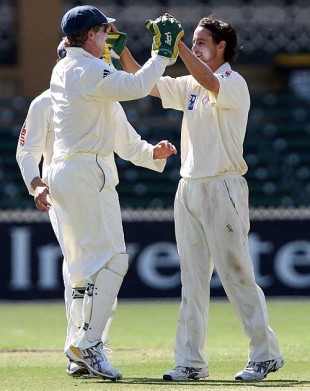The pressure's on the panel
Not much has been expected of Australia's selectors in recent years, but the time may have finally come for them to raise their game
Peter English
04-Apr-2008

| ||
Australia's selectors haven't really had much to do over the past decade apart from talk to senior players about their retirement plans. Their teams have been so full of enviable quality the debates have usually centred on who to leave out. As the country heads towards winter a fresh squad will start preparing for a not-so-certain future and the scrutiny on the players will be shared by the usually low-profile selectors.
Four uncapped men have been chosen in the Test squad for the West Indies, where Ricky Ponting will rebuild from the downturn that started after the first week of the year in Sydney - a five-day loss and a draw were followed by the CB Series finals defeat. Ponting goes to the Caribbean with the support of the selectors, who will be hoping their predictions and talent-spotting capabilities have improved.
Once the West Indies tour starts in May, Cricket Australia's 25 contract holders, who will receive base deals between A$160,000 and almost $1m, will have been settled, and the selectors do not want a repeat of the poor judgments of last year. Brad Hodge was the only batsman with a national deal to finish in the Pura Cup's top five run-scorers in 2007-08 and he is not headed for the Caribbean. Ben Hilfenhaus, who is in the Test squad, was the best placed bowler in 11th spot with 28 wickets in nine matches at an average of 43.82.
The emerging spinner Dan Cullen had a first-class mean of 49.44 and finished the campaign with a hand injury, Cullen Bailey, another contracted slow bowler, took a wicket in two games and Cameron White was outperformed by the 36-year-old Bryce McGain. For the West Indies the selectors have pushed for Stuart MacGill and Beau Casson, a left-arm wrist spinner who could not get a bowl in 71 first-innings overs of the Pura Cup final, but captured four, mostly from the lower order, as the game concluded.
Until January the hardest aspect of life for selectors on the panel was getting hold of the elusive Andrew Hilditch, the chairman, whose primary job is as an Adelaide lawyer. They were free to watch state games, a criterion that ruled more distinguished and thoughtful candidates out of the role when Allan Border twice stepped down, and would discuss over phone hook-ups whether Stuart Clark and Phil Jaques were the men to replace Glenn McGrath and Justin Langer - of course they were!
Deciding on which young player should gain experience on an overseas tour or one-day tournament was another assignment. Adam Voges, who was in that role over the past two seasons, has not been given a chance to tour the West Indies and will be with Nottinghamshire instead. He has had a couple of bats in an ODI and two Twenty20 games, scoring 42 lower-order runs quickly in appearances that could be barely classed as opportunities. Shaun Marsh, Voges' Western Australia team-mate, has joined the one-day squad in his place.
| The ragged panel has as much to prove as Hilfenhaus, Casson, Brad Haddin and Ashley Noffke do if they receive opportunities in the Caribbean. It operates in the way of a backroom mafia, with phone calls granted to their contract holders, and messages passed on through bland public statements such as "score more runs" and "demand selection" | |||
Following Adam Gilchrist's departure - he became the fifth big name to retire in 13 months - these selectors must define Australia's future direction. Similar tasks were performed successfully under the guidance of Laurie Sawle throughout the 1980s and 90s before Trevor Hohns assumed the chairman's role until exiting in 2006. Hilditch has been on the panel since 1996-97 and his current underlings are David Boon, Merv Hughes and Jamie Cox.
The ragged panel has as much to prove as Hilfenhaus, Casson, Brad Haddin and Ashley Noffke do if they receive chances in the Caribbean. It operates in the way of a backroom mafia, with phone calls granted to their contract holders, and messages passed on through bland public statements such as "score more runs" and "demand selection". Hughes and Boon, who were two of the most sweaty, blokey and committed players, are now suited and bespectacled, hurrying like men who have discovered corporate power.
Unfortunately for the pair, cricket lovers born in the late 1980s would not remember their drenched dressing-room celebrations after body-tearing deeds that made them national heroes. Their current major public displays are restricted to Boon's alcohol advertisements and Hughes' promotion of a breakfast cereal that he insists, through a range of double entendres, eases constipation. Soon Australian cricket will know whether Hughes' gut feel for potential fast bowlers is reliable or comes from the area he wants to cleanse.
Cox is a former domestic opening batsman who has retired to a place in a pay-television commentary booth. During his fine interstate career with Tasmania, Cox's national path was blocked by Mark Taylor, Michael Slater, Matthew Hayden and Langer, and he must wish he was born ten years later to take advantage of the recent and upcoming vacancies. Hilditch was the least formidable player - he remains famous for his inability to resist hooking during his 18-Test career - but is the most professional when not judged on match statistics.
This motley bunch now combines as the king-makers of Australia's next generation. So far things haven't gone to plan and as Ponting's team finds it harder to dominate like its predecessors, the true value of these selectors will be on display.
Peter English is the Australasia editor of Cricinfo